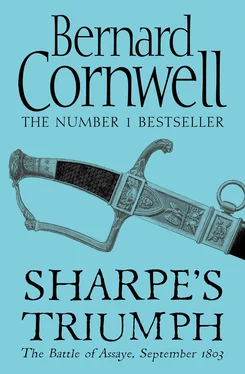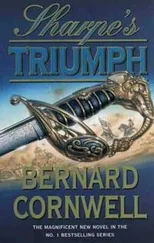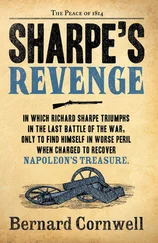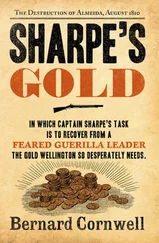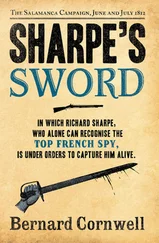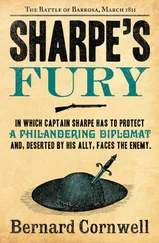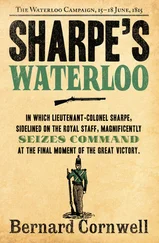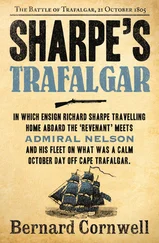Bernard Cornwell - Sharpe’s Triumph - The Battle of Assaye, September 1803
Здесь есть возможность читать онлайн «Bernard Cornwell - Sharpe’s Triumph - The Battle of Assaye, September 1803» — ознакомительный отрывок электронной книги совершенно бесплатно, а после прочтения отрывка купить полную версию. В некоторых случаях можно слушать аудио, скачать через торрент в формате fb2 и присутствует краткое содержание. Жанр: unrecognised, на английском языке. Описание произведения, (предисловие) а так же отзывы посетителей доступны на портале библиотеки ЛибКат.
- Название:Sharpe’s Triumph: The Battle of Assaye, September 1803
- Автор:
- Жанр:
- Год:неизвестен
- ISBN:нет данных
- Рейтинг книги:4 / 5. Голосов: 1
-
Избранное:Добавить в избранное
- Отзывы:
-
Ваша оценка:
- 80
- 1
- 2
- 3
- 4
- 5
Sharpe’s Triumph: The Battle of Assaye, September 1803: краткое содержание, описание и аннотация
Предлагаем к чтению аннотацию, описание, краткое содержание или предисловие (зависит от того, что написал сам автор книги «Sharpe’s Triumph: The Battle of Assaye, September 1803»). Если вы не нашли необходимую информацию о книге — напишите в комментариях, мы постараемся отыскать её.
Sharpe’s Triumph: The Battle of Assaye, September 1803 — читать онлайн ознакомительный отрывок
Ниже представлен текст книги, разбитый по страницам. Система сохранения места последней прочитанной страницы, позволяет с удобством читать онлайн бесплатно книгу «Sharpe’s Triumph: The Battle of Assaye, September 1803», без необходимости каждый раз заново искать на чём Вы остановились. Поставьте закладку, и сможете в любой момент перейти на страницу, на которой закончили чтение.
Интервал:
Закладка:
‘We’re going right now, sir?’ Sharpe asked, surprised by the suddenness of it all.
‘Right now,’ McCandless said. ‘Time waits for no man, Sharpe, and we have a traitor and a murderer to catch.’ He pulled himself into his saddle and watched as Sharpe clumsily mounted the second horse.
‘So where are you going?’ Stokes asked McCandless.
‘Ahmednuggur first, and after that God will decide.’ The Colonel touched his horse’s flanks with his spurs and Sharpe, his pack hanging from one shoulder and his musket slung on the other, followed.
He would redeem himself for the failure at Chasalgaon. Not with punishment, but with something better: with vengeance.
Major William Dodd ran a white-gloved finger down the spoke of a gunwheel. He inspected his fingertip and nearly nine hundred men, or at least as many of the nine hundred on parade who could see the Major, inspected him in return.
No mud or dust on the glove. Dodd straightened his back and glowered at the gun crews, daring any man to show pleasure in having achieved a near perfect turn-out. It had been hard work, too, for it had rained earlier in the day and the regiment’s five guns had been dragged through the muddy streets to the parade ground just inside Ahmednuggur’s southern gate, but the gunners had still managed to clean their weapons meticulously. They had removed every scrap of mud, washed the mahogany trails, then polished the barrels until their alloy of copper and tin gleamed like brass.
Impressive, Dodd thought, as he peeled off the glove. Pohlmann had left Ahmednuggur, retreating north to join his compoo to Scindia’s gathering army, and Dodd had ordered this surprise inspection of his new command. He had given the regiment just one hour’s notice, but so far he had found nothing amiss. They were impressive indeed; standing in four long white-coated ranks with their four cannon and single howitzer paraded at the right flank. The guns themselves, despite their gleam, were pitiful things. The four field guns were mere four-pounders, while the fifth was a five-inch howitzer, and not one of the pieces fired a ball of real weight. Not a killing ball. ‘Peashooters!’ Dodd said disparagingly.
‘Monsieur?’ Captain Joubert, the Frenchman who had desperately hoped to be given command of the regiment himself, asked.
‘You heard me, Monsewer. Peashooters!’ Dodd said as he lifted a limber’s lid and hoisted out one of the four-pounder shots. It was half the size of a cricket ball. ‘You might as well spit at them, Monsewer!’
Joubert, a small man, shrugged. ‘At close range, Monsieur…’ he began to defend the guns.
‘At close range, Monsewer, close range!’ Dodd tossed the shot to Joubert who fumbled the catch. ‘That’s no use at close range! No more use than a musket ball, and the gun’s ten times more cumbersome than a musket.’ He rummaged through the limber. ‘No canister? No grape?’
‘Canister isn’t issued for four-pounder guns,’ Joubert said. ‘It isn’t even made for them.’
‘Then we make our own,’ Dodd said. ‘Bags of scrap metal, Monsewer, strapped to a sabot and a charge. One and a half pounds of powder per round. Find a dozen women in the town and have them sew up the bags. Maybe your wife can help, Monsewer?’ He leered at Joubert who showed no reaction. Dodd could smell a man’s weakness, and the oddly attractive Simone Joubert was undoubtedly her husband’s weakness, for she clearly despised him and he, just as clearly, feared losing her. ‘I want thirty bags of grape for each gun by this time tomorrow,’ Dodd ordered.
‘But the barrels, Major!’ Joubert protested.
‘You mean they’ll be scratched?’ Dodd jeered. ‘What do you want, Monsewer? A scratched bore and a live regiment? Or a clean gun and a row of dead men? By tomorrow, thirty rounds of canister per gun, and if there ain’t room in the limbers then throw out that bloody round shot. Might as well spit cherrystones as fire those pebbles.’ Dodd slammed down the limber’s lid. Even if the guns fired makeshift grapeshot he was not certain that they were worth keeping. Every battalion in India had such close-support artillery, but in Dodd’s opinion the guns only served to slow down a regiment’s manoeuvres. The weapons themselves were cumbersome, and the livestock needed to haul them was a nuisance, and if he were ever given his own compoo he would strip the regiments of field guns, for if a battalion of infantry could not defend itself with firelocks, what use was it? But he was stuck with the five guns, so he would use them as giant shotguns and open fire at three hundred yards. The gunners would moan about the damage to their barrels, but damn the gunners.
Dodd inspected the howitzer, found it as clean as the other guns, and nodded to the gunner-subadar. He offered no compliment, for Dodd did not believe in praising men for merely doing their duty. Praise was due to those who exceeded their duty, punishment for those who fell short, and silence must serve the rest.
Once the five guns had been inspected Dodd walked slowly down the white-jacketed infantry ranks where he looked every man in the eye and did not change his grim expression once, even though the soldiers had taken particular care to be well turned out for their new commanding officer. Captain Joubert followed a pace behind Dodd and there was something ludicrous about the conjunction of the tall, long-legged Dodd and the diminutive Joubert who needed to scurry to keep up with the Englishman. Once in a while the Frenchman would make a comment. ‘He’s a good man, sir,’ he might say as they passed a soldier, but Dodd ignored all the praise and, after a while, Joubert fell silent and just scowled at Dodd’s back. Dodd sensed the Frenchman’s dislike, but did not care.
Dodd showed no reaction to the regiment’s appearance, though all the same he was impressed. These men were smart and their weapons were as clean as those of his own sepoys who, reissued with white jackets, now paraded as an extra company at the regiment’s left flank where, in British regiments, the skirmishers paraded. East India Company battalions had no skirmishers, for it was believed that sepoys were no good at the task, but Dodd had decided to make his loyal sepoys into the finest skirmishers in India. Let them prove the Company wrong, and in the proving they could help destroy the Company.
Most of the men looked up into Dodd’s eyes as he walked by, although few of them looked at him for long, but instead glanced quickly away. Joubert saw the reaction, and sympathized with it, for there was something distinctly unpleasant about the Englishman’s long sour face that edged on the frightening. Probably, Joubert decided, this Englishman was a flogger. The English were notorious for using the whip on their own men, reducing redcoats’ backs to welters of broken flesh and gleaming blood, but Joubert was quite wrong about Dodd. Major Dodd had never flogged a man in his life, and that was not just because the Company forbade it in their army, but because William Dodd disliked the lash and hated to see a soldier flogged. Major Dodd liked soldiers. He hated most officers, especially those senior to him, but he liked soldiers. Good soldiers won battles, and victories made officers famous, so to be successful an officer needed soldiers who liked him and who would follow him. Dodd’s sepoys were proof of that. He had looked after them, made sure they were fed and paid, and he had given them victory. Now he would make them wealthy in the service of the Mahratta princes who were famous for their generosity.
He broke away from the regiment and marched back to its colours, a pair of bright-green flags marked with crossed tulwars. The flags had been the choice of Colonel Mathers, the Englishman who had commanded the regiment for five years until he resigned rather than fight against his own countrymen, and now the regiment would be known as Dodd’s regiment. Or perhaps he should call it something else. The Tigers? The Eagles? The Warriors of Scindia? Not that the name mattered now. What mattered now was to save these nine hundred well-trained men and their five gleaming guns and take them safely back to the Mahratta army that was gathering in the north. Dodd turned beneath the colours. ‘My name is Dodd!’ he shouted, then paused to let one of his Indian officers translate his words into Marathi, a language Dodd did not speak. Few of the soldiers spoke Marathi either, for most were mercenaries from the north, but men in the ranks murmured their own translation and so Dodd’s message was relayed up and down the files. ‘I am a soldier! Nothing but a soldier! Always a soldier!’ He paused again. The parade was being held in the open space inside the gate and a crowd of townsfolk had gathered to gape at the troops, and among the crowd was a scatter of the robed Arab mercenaries who were reputed to be the fiercest of all the Mahratta troops. They were wild-looking men, armed with every conceivable weapon, but Dodd doubted they had the discipline of his regiment. ‘Together,’ he shouted at his men, ‘you and I shall fight and we shall win.’ He kept his words simple, for soldiers always liked simple things. Loot was simple, winning and losing were simple ideas, and even death, despite the way the damned preachers tried to tie it up in superstitious knots, was a simple concept. ‘It is my intent,’ he shouted, then waited for the translation to ripple up and down the ranks, ‘for this regiment to be the finest in Scindia’s service! Do your job well and I shall reward you. Do it badly, and I shall let your fellow soldiers decide on your punishment.’ They liked that, as Dodd had known they would.
Читать дальшеИнтервал:
Закладка:
Похожие книги на «Sharpe’s Triumph: The Battle of Assaye, September 1803»
Представляем Вашему вниманию похожие книги на «Sharpe’s Triumph: The Battle of Assaye, September 1803» списком для выбора. Мы отобрали схожую по названию и смыслу литературу в надежде предоставить читателям больше вариантов отыскать новые, интересные, ещё непрочитанные произведения.
Обсуждение, отзывы о книге «Sharpe’s Triumph: The Battle of Assaye, September 1803» и просто собственные мнения читателей. Оставьте ваши комментарии, напишите, что Вы думаете о произведении, его смысле или главных героях. Укажите что конкретно понравилось, а что нет, и почему Вы так считаете.
